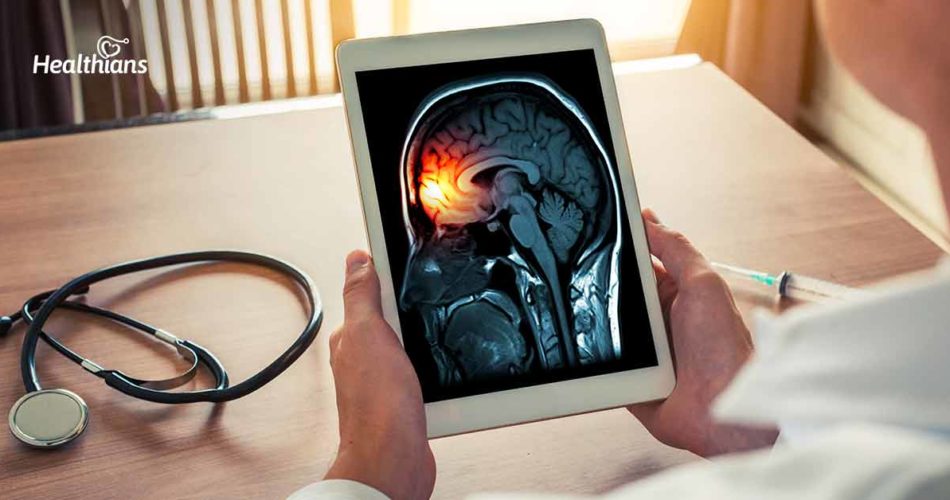Contributed by: Healthians Team
Introduction
Meningitis is an infection that causes inflammation in the delicate protective membranes — called meninges — that surround the brain and spinal cord. This swelling can result in life-threatening complications.
These frequently asked questions and answers should help you understand the symptoms, causes, and diagnosis advice of the serious infection. Let’s explore meningitis in more detail.
FAQ #1: What causes meningitis?
Meningitis almost always results from viral infection from microorganisms. It may also be caused by bacterial infections (the most serious cases) and, rarely, fungal and parasitic infections. Other causes are tumours, certain medications, and other forms of infections.
FAQ #2: What are the clinical symptoms of meningitis?
Common symptoms of meningitis can include:
- Fever
- Confusion and irritability
- Headache along with nausea or vomiting
- A stiff neck
- Numbness in the face
- Difficulty in waking up
- Sensitivity to bright lights
- Drowsiness or unresponsiveness
- Seizures (fits)
- Lack of appetite and thirst
- Rash on the skin (with meningococcal meningitis)
Less common causes of meningitis include:
- Autoimmune disorders
- Cancer medications
- Syphilis
- Tuberculosis
- Brain surgery
FAQ #3: How long does it take for the symptoms to manifest?
The initial signs and symptoms of viral meningitis usually appear three to seven days after exposure to the infection.
FAQ #4: How does meningitis headache feel?
Headache is usually a predominant symptom of meningitis. A headache caused by meningitis is generalized all over the head and is typically described as severe and unrelenting. It does not subside by taking a pain killer.
FAQ #5: Which age group is at high risk for contracting meningitis?
Anyone can be affected by meningococcal disease, but is most common in the below age groups:
- Children under 5 years of age
- Teenagers and young adults between the age of 16 to 25 years
- Adults over 55 years of age
- People with certain medical conditions, such as a damaged spleen, long-term disease, or immune system disorders
FAQ #6: How does the disease spread?
Person-to-person spread can happen with direct and indirect contact between individuals through:
- Coughing up droplets
- Sneezing
- Kissing
- Contact with the faeces
- Eating contaminated food
- Sharing food utensils or drinking cups with an infected person
- Sharing toothbrushes or cigarettes with an infected person
FAQ #7: Is meningitis serious?
Because meningitis affects the brain, it can be serious if not treated quickly. It can cause blood poisoning (septicaemia), a life-threatening inflammation that can result in permanent damage to the brain or nerves.
FAQ #8: Does meningitis cause mental disorders?
Meningitis can make people feel unwell and leave them with numerous life-altering after effects, including depression, exhaustion, balance problems, and mood swings. In addition, meningitis can also have a long term impact on an individual’s memory and leave survivors with a host of health problems that make returning to ‘normal’ completely impossible.
FAQ #9: Are vaccines available for the prevention of the disease?
Yes, there are a variety of vaccines that provide some protection against meningitis.
FAQ #10: What are some possible complications of meningitis?
Although most people recover completely from meningitis, it can occasionally cause major long-term complications and even death. This is why it’s critical to get medical assistance as soon as possible for the successful management of meningitis. The following are some of the most prevalent complications caused by meningitis:
- Hearing loss (partial or total)
- Vision loss (partial or total)
- Loss of limbs
- Bone and joint problems
- Recurrent seizures (epilepsy)
- Problems with memory and concentration
- Co-ordination, movement and balance problems
- Learning difficulties and behavioural problems
- Kidney problems
FAQ #11: How is meningitis diagnosed?
Your doctor will investigate your medical history and perform a physical examination, which will include checking for stiffness in your neck and looking for a skin rash that could indicate a bacterial infection.
They will also need to run a few tests that can include:
- Blood tests to find bacteria
- CT or MRI scans of the head to look for inflammation
- Spinal tap (where a needle is used to extract fluid from around the spinal cord)
- Chest X-ray to look for signs of infection
FAQ #12: Does meningitis go away by itself?
Mild viral meningitis will usually get better on its own within 7 to 10 days without causing any long-term problems. Bacterial meningitis needs to be treated quickly with antibiotics.
FAQ #13: Does meningitis require hospitalization?
Bacterial meningitis necessitates hospitalisation right away. Complications of permanent neurological damage can be avoided with early detection.
FAQ #14: Can meningitis cause problems later in life?
Sometimes, the symptoms are temporary, and they usually fade away within a few days or weeks. In some situations, however, they can become lifelong and even life-threatening
FAQ #15: What are the long term side effects of bacterial meningitis?
Despite the fact that most people recover entirely from meningitis, it can occasionally lead to serious long-term consequences and even death. Some of the long-term side effects despite recovery include:
- Fatigue.
- Difficulty concentrating.
- Headaches
- Depression
- Photophobia (discomfort when looking at light)
- Dizziness and impaired balance and coordination
- Behavioral, learning, memory, or intellectual deficits
Final thoughts
Meningitis can strike anyone, at any age, anywhere in the world. Early symptoms of meningitis may resemble those of influenza (flu), including fever, headache, nausea and vomiting, irritability, sore throat, and decreased appetite. This makes early detection difficult.
If you notice the signs and symptoms, we strongly advise you to get medical help right away. Also, keeping a check on your overall health with regular health screenings is a great way of getting a comprehensive insight into your well being and taking preventive measures if any issues might arise.



